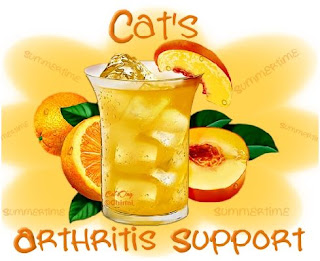
Arthritis in cats and dogs causes the pet's joints to become inflamed. Though arthritis in pets is rare, large dogs are more prone to developing arthritis than cats are smaller dogs.
Arthritis is more debilitating in larger pets. While arthritis in a small dog or cat may not cause much disability, the impairment can be significant for a large dog.
If the cartilage or soft tissue of the joints become damaged or worn, it can cause arthritis. Older pets are more likely to develop arthritis than younger pets.
Many times, arthritis in cats and dogs is the result of a traumatic injury to the joint. Dogs and cats with arthritis may try to avoid putting weight on the joints. Arthritis often causes the pet to limp.
Arthritis can be a very painful condition. Veterinarians may prescribe anti-inflammatory drugs for long-term or short-term pain relief.
Weight management of the pet and an ideal amount of daily exercise can help reduce the pain and impairment caused by arthritis. If a pet with arthritis is overweight, the veterinarian may suggest a low-fat pet food.
In severe cases of dog and cat arthritis, surgery may be recommended. Surgery can be used to clean torn cartilage or debris from the joint, fuse a joint, or do a joint replacement.
Some accommodations in the home can help to make a pet with arthritis more comfortable. Substantially padded pet beds are an example of things that can help a pet with arthritis.
Pet owners may be tempted to give their pets with arthritis and anti-inflammatory drug made for humans. Anti-inflammatory medication manufactured for human consumption can be poisonous to pets.
Glucosamine, and chondroitan, and polysulfated glycosaminoglycans (GAGs) are commonly used alternative treatments for cat and dog arthritis. Even though polysulfated glycosaminoglycans is the only one that has been shown through medical research to be effective, many dog and cat owners report the successful use of glycosamine and chondroitan.
Many herbal remedies and other products are marketed as treatments for pet arthritis. A pet owner should not give their pet a new supplements, herbal remedies, or medication without consulting the veterinarian. Magnetic pet collars are another form of alternative treatment for arthritis.
Arthritis is more debilitating in larger pets. While arthritis in a small dog or cat may not cause much disability, the impairment can be significant for a large dog.
If the cartilage or soft tissue of the joints become damaged or worn, it can cause arthritis. Older pets are more likely to develop arthritis than younger pets.
Many times, arthritis in cats and dogs is the result of a traumatic injury to the joint. Dogs and cats with arthritis may try to avoid putting weight on the joints. Arthritis often causes the pet to limp.
Arthritis can be a very painful condition. Veterinarians may prescribe anti-inflammatory drugs for long-term or short-term pain relief.
Weight management of the pet and an ideal amount of daily exercise can help reduce the pain and impairment caused by arthritis. If a pet with arthritis is overweight, the veterinarian may suggest a low-fat pet food.
In severe cases of dog and cat arthritis, surgery may be recommended. Surgery can be used to clean torn cartilage or debris from the joint, fuse a joint, or do a joint replacement.
Some accommodations in the home can help to make a pet with arthritis more comfortable. Substantially padded pet beds are an example of things that can help a pet with arthritis.
Pet owners may be tempted to give their pets with arthritis and anti-inflammatory drug made for humans. Anti-inflammatory medication manufactured for human consumption can be poisonous to pets.
Glucosamine, and chondroitan, and polysulfated glycosaminoglycans (GAGs) are commonly used alternative treatments for cat and dog arthritis. Even though polysulfated glycosaminoglycans is the only one that has been shown through medical research to be effective, many dog and cat owners report the successful use of glycosamine and chondroitan.
Many herbal remedies and other products are marketed as treatments for pet arthritis. A pet owner should not give their pet a new supplements, herbal remedies, or medication without consulting the veterinarian. Magnetic pet collars are another form of alternative treatment for arthritis.
About the Author:
Moses Wright is a big lover of cats. He set up this site to help fellow cat lovers with their cat health questions and provide more info on common cat diseases symptoms.
No comments:
Post a Comment